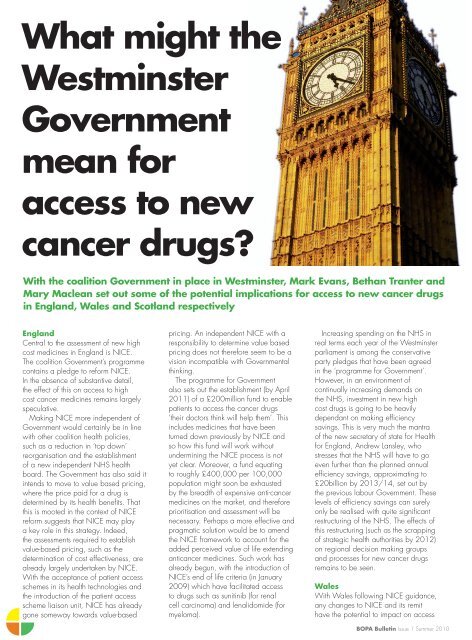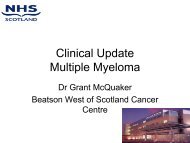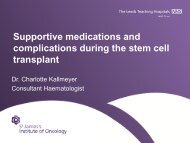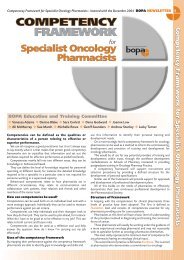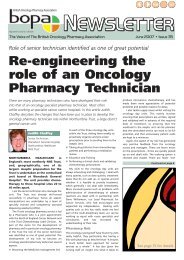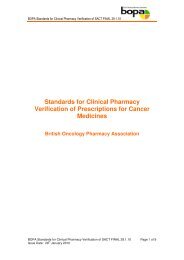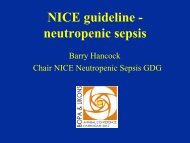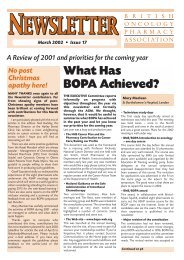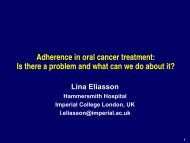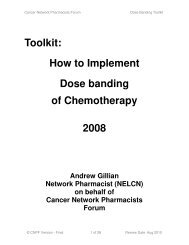What might the current Westminster Government mean for ... - BOPA
What might the current Westminster Government mean for ... - BOPA
What might the current Westminster Government mean for ... - BOPA
Create successful ePaper yourself
Turn your PDF publications into a flip-book with our unique Google optimized e-Paper software.
<strong>What</strong> <strong>might</strong> <strong>the</strong><br />
<strong>Westminster</strong><br />
<strong>Government</strong><br />
<strong>mean</strong> <strong>for</strong><br />
access to new<br />
cancer drugs?<br />
With <strong>the</strong> coalition <strong>Government</strong> in place in <strong>Westminster</strong>, Mark Evans, Bethan Tranter and<br />
Mary Maclean set out some of <strong>the</strong> potential implications <strong>for</strong> access to new cancer drugs<br />
in England, Wales and Scotland respectively<br />
England<br />
Central to <strong>the</strong> assessment of new high<br />
cost medicines in England is NICE.<br />
The coalition <strong>Government</strong>’s programme<br />
contains a pledge to re<strong>for</strong>m NICE.<br />
In <strong>the</strong> absence of substantive detail,<br />
<strong>the</strong> effect of this on access to high<br />
cost cancer medicines remains largely<br />
speculative.<br />
Making NICE more independent of<br />
<strong>Government</strong> would certainly be in line<br />
with o<strong>the</strong>r coalition health policies,<br />
such as a reduction in ‘top down’<br />
reorganisation and <strong>the</strong> establishment<br />
of a new independent NHS health<br />
board. The <strong>Government</strong> has also said it<br />
intends to move to value based pricing,<br />
where <strong>the</strong> price paid <strong>for</strong> a drug is<br />
determined by its health benefits. That<br />
this is mooted in <strong>the</strong> context of NICE<br />
re<strong>for</strong>m suggests that NICE may play<br />
a key role in this strategy. Indeed,<br />
<strong>the</strong> assessments required to establish<br />
value-based pricing, such as <strong>the</strong><br />
determination of cost effectiveness, are<br />
already largely undertaken by NICE.<br />
With <strong>the</strong> acceptance of patient access<br />
schemes in its health technologies and<br />
<strong>the</strong> introduction of <strong>the</strong> patient access<br />
scheme liaison unit, NICE has already<br />
gone someway towards value-based<br />
pricing. An independent NICE with a<br />
responsibility to determine value based<br />
pricing does not <strong>the</strong>re<strong>for</strong>e seem to be a<br />
vision incompatible with <strong>Government</strong>al<br />
thinking.<br />
The programme <strong>for</strong> <strong>Government</strong><br />
also sets out <strong>the</strong> establishment (by April<br />
2011) of a £200million fund to enable<br />
patients to access <strong>the</strong> cancer drugs<br />
‘<strong>the</strong>ir doctors think will help <strong>the</strong>m’. This<br />
includes medicines that have been<br />
turned down previously by NICE and<br />
so how this fund will work without<br />
undermining <strong>the</strong> NICE process is not<br />
yet clear. Moreover, a fund equating<br />
to roughly £400,000 per 100,000<br />
population <strong>might</strong> soon be exhausted<br />
by <strong>the</strong> breadth of expensive anti-cancer<br />
medicines on <strong>the</strong> market, and <strong>the</strong>re<strong>for</strong>e<br />
prioritisation and assessment will be<br />
necessary. Perhaps a more effective and<br />
pragmatic solution would be to amend<br />
<strong>the</strong> NICE framework to account <strong>for</strong> <strong>the</strong><br />
added perceived value of life extending<br />
anticancer medicines. Such work has<br />
already begun, with <strong>the</strong> introduction of<br />
NICE’s end of life criteria (in January<br />
2009) which have facilitated access<br />
to drugs such as sunitinib (<strong>for</strong> renal<br />
cell carcinoma) and lenalidomide (<strong>for</strong><br />
myeloma).<br />
Increasing spending on <strong>the</strong> NHS in<br />
real terms each year of <strong>the</strong> <strong>Westminster</strong><br />
parliament is among <strong>the</strong> conservative<br />
party pledges that have been agreed<br />
in <strong>the</strong> ‘programme <strong>for</strong> <strong>Government</strong>’.<br />
However, in an environment of<br />
continually increasing demands on<br />
<strong>the</strong> NHS, investment in new high<br />
cost drugs is going to be heavily<br />
dependant on making efficiency<br />
savings. This is very much <strong>the</strong> mantra<br />
of <strong>the</strong> new secretary of state <strong>for</strong> Health<br />
<strong>for</strong> England, Andrew Lansley, who<br />
stresses that <strong>the</strong> NHS will have to go<br />
even fur<strong>the</strong>r than <strong>the</strong> planned annual<br />
efficiency savings, approximating to<br />
£20billion by 2013/14, set out by<br />
<strong>the</strong> previous labour <strong>Government</strong>. These<br />
levels of efficiency savings can surely<br />
only be realised with quite significant<br />
restructuring of <strong>the</strong> NHS. The effects of<br />
this restructuring (such as <strong>the</strong> scrapping<br />
of strategic health authorities by 2012)<br />
on regional decision making groups<br />
and processes <strong>for</strong> new cancer drugs<br />
remains to be seen.<br />
Wales<br />
With Wales following NICE guidance,<br />
any changes to NICE and its remit<br />
have <strong>the</strong> potential to impact on access<br />
<strong>BOPA</strong> Bulletin Issue 1 Summer 2010


